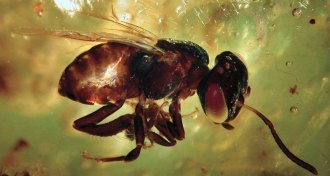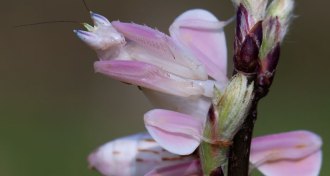Search Results for: Bees
Skip to resultsCan’t find what you’re looking for? Visit our FAQ page.
1,564 results for: Bees
-
 Paleontology
PaleontologyDinosaur dreams dashed
Fans of 'Jurassic Park' may be disappointed (or possibly relieved) to learn that you can’t get ancient DNA from amber.
-
 Animals
AnimalsA corsage that bites
The orchid mantis uses a flowery subterfuge to lure prey.
By Susan Milius -
 Life
LifeLife
Happy orangutans, vitamins from pollinators and ancient bug eyes in this week's news
By Science News -
 Life
LifeLearnin’ lizards
Underrated reptiles figure out what to do when the old rules change.
By Susan Milius -
 Life
LifeLife
Slacker fish, carnivorous pitfalls, a dinosaur gap and more in this week’s news.
By Science News -
 Chemistry
ChemistryCloud seeding by trees could alter precipitation, climate
Some tree pollens shed molecules that can affect precipitation.
By Janet Raloff -

19618
The evidence at best is fuzzy for bee recognition of faces. Both sugar water and quinine have unique odors that are probably readily recognizable by bees. And what do the feeders look like in the bee spectral range? Jacques M. DulinSequim, Wash. For the test of bees’ face recognition, the researchers used empty, identical feeders […]
By Science News -

19628
In this article about using harmonic reflected signals to track bees, I thought it was interesting to note that the original technology was created by the Russians as a spy device. The technology is still being used for a form of spying. Dwight ElveySanta Cruz, Calif.
By Science News -
 Animals
AnimalsLady MacBee
In one stingless Brazilian species, young queens shut out of succession in their own hives often usurp another colony’s throne.
By Susan Milius -
 Life
LifeWhy flies can drink and drink
Fruit flies use sophisticated pumps to suck fluids as thick as syrup.
-
 Paleontology
PaleontologyIndia yields fossil trove in amber
Insect remains suggest the continent hosted a surprisingly wide variety of creatures 50 million years ago.
-
 Life
LifeFlower sharing may be unsafe for bees
Wild pollinators are catching domesticated honeybee viruses, possibly by touching the same pollen.
By Susan Milius